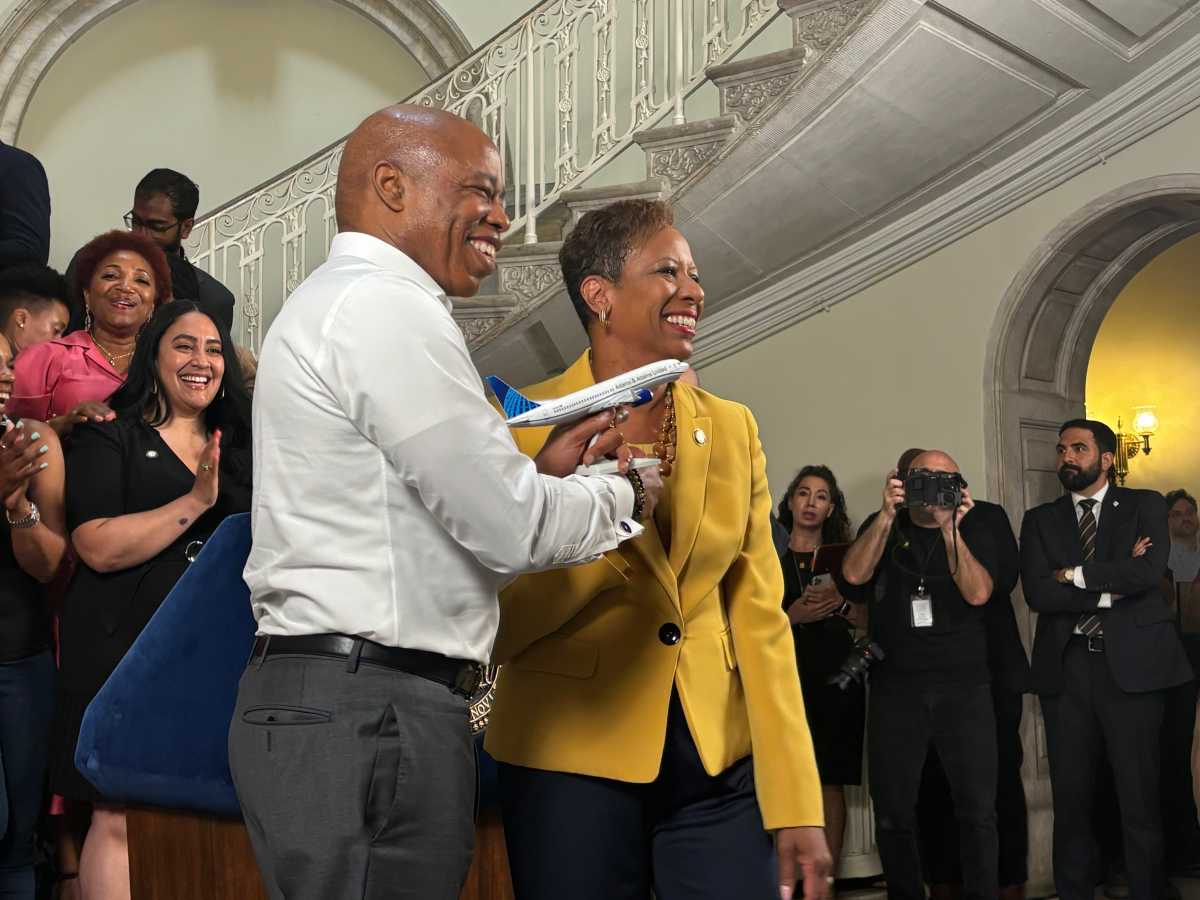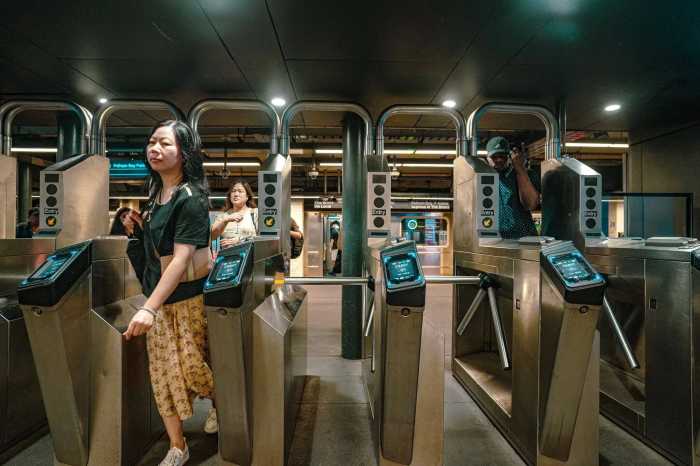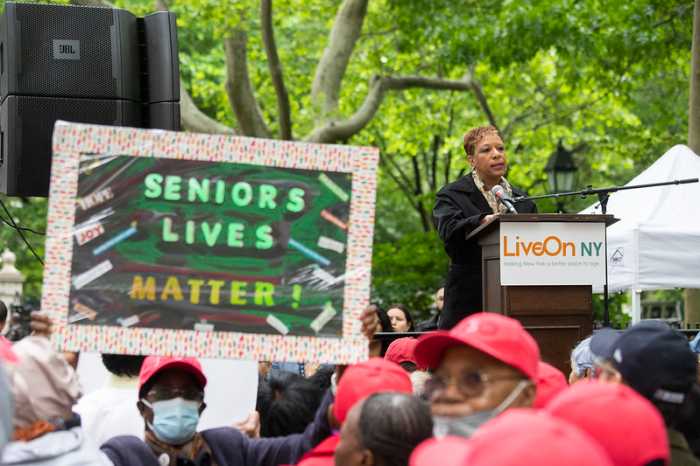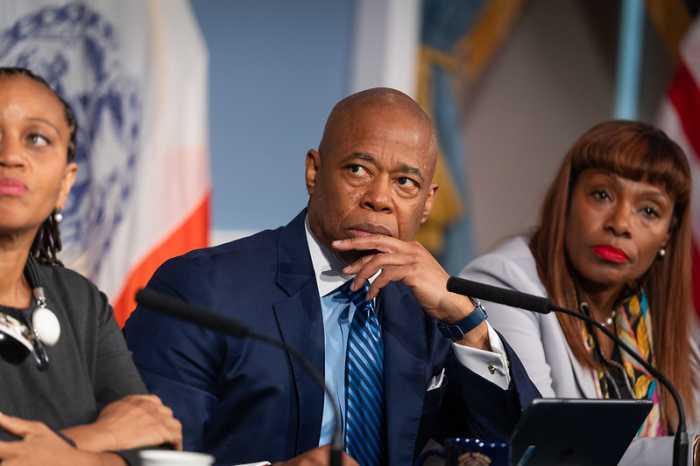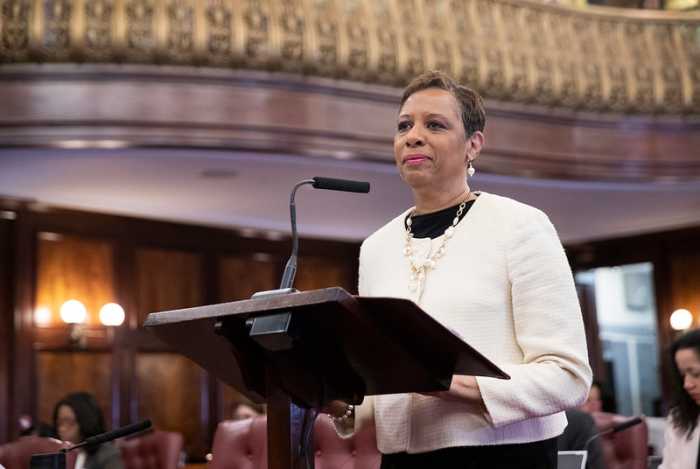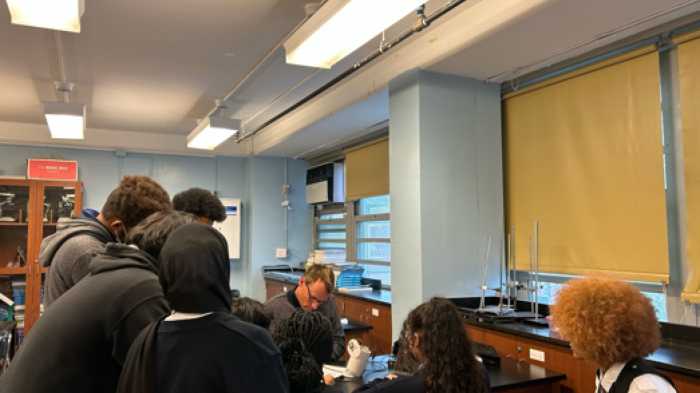Mayor Eric Adams and City Council Speaker Adrienne Adams capped off another contentious round of city budget negotiations on Friday by shaking hands on a tentative $112.4 billion Fiscal Year 2025 spending plan that restores many of the mayor’s unpopular cuts.
The not-yet-finalized budget deal comes just two days before the June 30 deadline by which the City Council must adopt a financial blueprint for the upcoming fiscal year. It also dispels speculation that the spending plan would be late this year.
The tentative budget is up roughly $5.4 billion from last year’s $107 billion adopted plan and $800 million from Hizzoner’s $111.6 billion executive proposal in April. The plan restores $349 million in funding for various items, including the city’s three public library systems, cultural institutions, parks, and early childhood education programs.
“Today, we deliver a budget that invests in the future of our city and the working people who live here,” Mayor Adams said during the budget deal announcement at City Hall on Friday afternoon. “Our actions have helped us arrive at a strong fiscally responsible budget today that has allowed us to partner with the council together, invest in our early childhood education, cultural organizations, libraries, parks, public safety, housing and health care. budget.”
The Speaker called the budget process, for much of which the council was focused on restoring the mayor’s cuts, “most difficult.”
“Throughout this year’s budget process, the council has been clear-eyed about the needs of the communities we represent and what working families require to live in a city they love,” the speaker said. “The Council works hard to secure investments for these priorities within this budget, because they matter to New Yorkers and are irreplaceable. We are immensely proud of the work to restore this funding.”
The Speaker said all of the council’s top priorities for restorations were addressed by the spending plan. She added that the city must “move away” from a budgeting process focused on restoring cuts.
The budget also includes $2 billion for creating new affordable housing and preserving existing public housing—as well as $10 million to expand eligibility for the Fair Fares half-priced MetroCard program for low-income New Yorkers from 120% of the federal poverty level to 145%.
However, the council did not restore all of the mayor’s cuts.
For instance, the budget does not include as much funding for the city’s Universal Pre-K and 3-K programs as advocates and lawmakers had been calling for. The plan added $20 million to expand the two programs by roughly 2,000 seats in areas with the most need, which is less than the $170 million the mayor eliminated through two rounds of cuts.
Yet Council Finance Chair Justin Brannan said that while the council would have liked more funding for the programs, they must first be revamped to fix a mismatch between empty seats in certain parts of the city and a waiting list for seats in other areas. The deal also includes a working group between the administration and the council that will figure out how to revamp the programs.
“We needed to do more than just restore those cuts, we needed to be smart about it because we have a system right now that has a waitlist and a lot of vacant seats,” Brannan said. “So, it needs reform, it doesn’t just need more money. And I think we’re sort of going to hit reset on that whole system and do 3-K, Pre-K 2.0 and do it right.”
The mayor has long made a similar argument that the programs must be realigned before greenlighting more seats because the city was paying for spots that no children were occupying.
Child care advocates, however, still voiced frustration with the final deal.
“Parents are grateful to the New York City Council for their herculean efforts in achieving a budget that rolls back some of the Mayor’s cuts to 3-K,” said Rebecca Bailin, executive director of New Yorkers United for Child Care. “Despite these steps, families are still facing millions in unnecessary cuts to 3-K and Pre-K. As child care costs soar, the Mayor should be focused on ensuring every family can access free 3-K; instead, the Mayor continues to underinvest in this lifeline for working families.”
The mayor’s relenting on many of his belt-tightening measures comes after months-long public pressure campaign paired with low poll numbers that showed the reductions to be deeply unpopular.
The deal comes after months of heated negotiations over across-the-board 5% cuts Mayor Adams enacted in November and January. He insists the reductions were necessary to balance the city’s books as spending on the influx of over 200,000 migrants has cost the city over $4 billion and as billions more in federal pandemic aid is set to expire.
The mayor then backtracked on some of his more unpopular reductions in January, restoring funding for NYPD academy classes and litter basket service that he had chopped earlier. He also canceled a third round of trims that was set for April, but left most others in place.
He justified the reversals by arguing that his extremely conservative fiscal approach allowed the city to avoid a financial crisis. His budget office revised its revenue projections upward and implemented a plan to reduce migrant crisis spending by 30%.
The council has long argued the cuts were unnecessary because the city had enough available revenue to avoid them — a notion City Hall denies.
During the news conference, Adams insisted that the cuts were neccessary because of financial “uncertainties” driven by the influx of migrants last fall. He said the cuts combined with limits on migrant spending, including how long they can stay in city shelters, since then brought the costs under control.
“I don’t live my life through the rearview mirror, I live it through the front windshield,” Adams said. “We made decisions based on the uncertainties we were facing … If we didn’t put in place real initiatives to bring down the numbers, we would be having a different conversation right now.”
Much of the focus of this budget cycle surrounded making the city’s public libraries whole after the mayor’s November cuts to the systems caused them to end Sunday service at most branches. The budget will reallocate $58 million to the library systems that were previously trimmed, $43 million of which will be baselined—meaning the funding will not be subject to negotiations next year.
In a joint statement, public library leaders called the restoration a “ resounding victory” for New Yorkers. They said the funding will allow them to bring back seven-day service in the coming weeks and to continue universal six-day service, which has been in place for nearly a decade.
“We are honored to be able to continue the vital programs, initiatives, and hours of operation that this great city so clearly wants, needs, and deserves,” the library leaders said.



